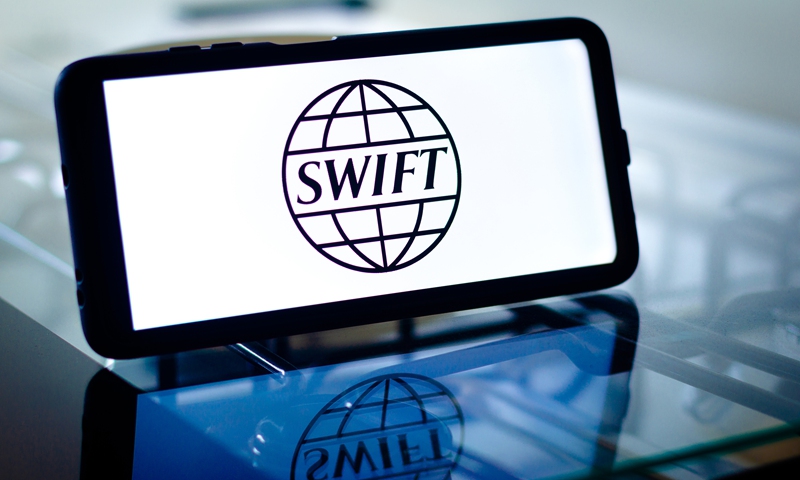
SWIFT Photo: VCG
After Russia conducted "a special military operation" in the Donbass region on February 24, the US and EU launched a new round of sanctions against Moscow on Saturday, covering a wide range of areas, including finance and trade, travel, air services, sports and culture.
Among them, strengthening financial sanctions has been the trend in recent years as the US and Europe choose to weaponize financial instruments. By mainly weakening a sanctioned country's financing ability, restricting capital flow and causing significant economic losses, they aim to force others to compromise and submit to their will.
The exclusion of certain Russian banks from the SWIFT system is at the heart of the financial sanctions, which would block them from access to the international financial information exchange platform cracking down on the Russian economy through restrictions of capital flows in and out of Russia.
Given that the EU is Russia's largest trading partner, such sanctions will affect Europe, especially Germany and other countries that need Russia's natural gas. Therefore, they chose to exclude just certain Russian banks, to limit the impact on EU nations.
It is not hard to imagine that Russia has developed a strategy to limit the damage since the country has been facing repeated calls to exclude it from SWIFT since 2014.
Russia started to setup its own SPFS system, an equivalent to SWIFT, since 2015. By May 2021, transactions using SPFS reached one-fifth of the total transactions made with SWIFT within Russia. Both Russia's SPFS and China's CIPS systems can technically replace SWIFT. The latest sanctions, to some extent, are sending some SWIFT users to these two or other systems.
In fact, after the 9/11 attacks, the US has gradually strengthened its control over SWIFT under the name of anti-terrorism, requiring members to comply with their requirements with penalties for those who fail to comply. This financial information service platform, which was shaped by international financial institutions, has been increasingly serving American foreign policy.
In 2012, the US first cut Iran's ties to the SWIFT system. It then threatened to use this measure against "hostile states" and EU members with economic ties with Iran. Given that the relations between the US and Russia have continued to deteriorate after the disintegration of the Soviet Union, Moscow became a main target of the US' SWIFT sanctions.
The ban on the SWIFT system against Russia was proposed several times since 2014 but failed to be implemented. Later, in 2019, the US wielded this tool on Venezuela. Now, this sanction on Russia is the latest example of the US using the SWIFT system against others.
However, this is a mutual destructive act of weaponizing the financial infrastructure, a public good of the international community. Neither side gains.
Of course, the hardest hit is Russia. But, with only certain banks excluded from SWIFT, the damage to Russia could be manageable.
The EU, Russia's largest trading partner, will be hit next. But the damage on the EU is also manageable, since sanctions exclude the natural gas and energy sectors.
Economic and trade between China and Russia has greatly increased in recent years with bilateral trade exceeding $100 trillion for many years in a row. Both the euro and yuan are partly used in trading activities, and both sides have inked a currency swap agreement. Therefore, the exclusion of some Russian banks from SWIFT will have a limited impact thanks to the economic exchanges between Russia and China.
Meanwhile, other countries with economic ties to Russia will be directly or indirectly affected. And when this happens, the world economy as a whole will also be affected to some extent.
The author is an associate research fellow of the Institute of Russian, Eastern European and Central Asian Studies under the Chinese Academy of Social Sciences. bizopinion@globaltimes.com.cn




